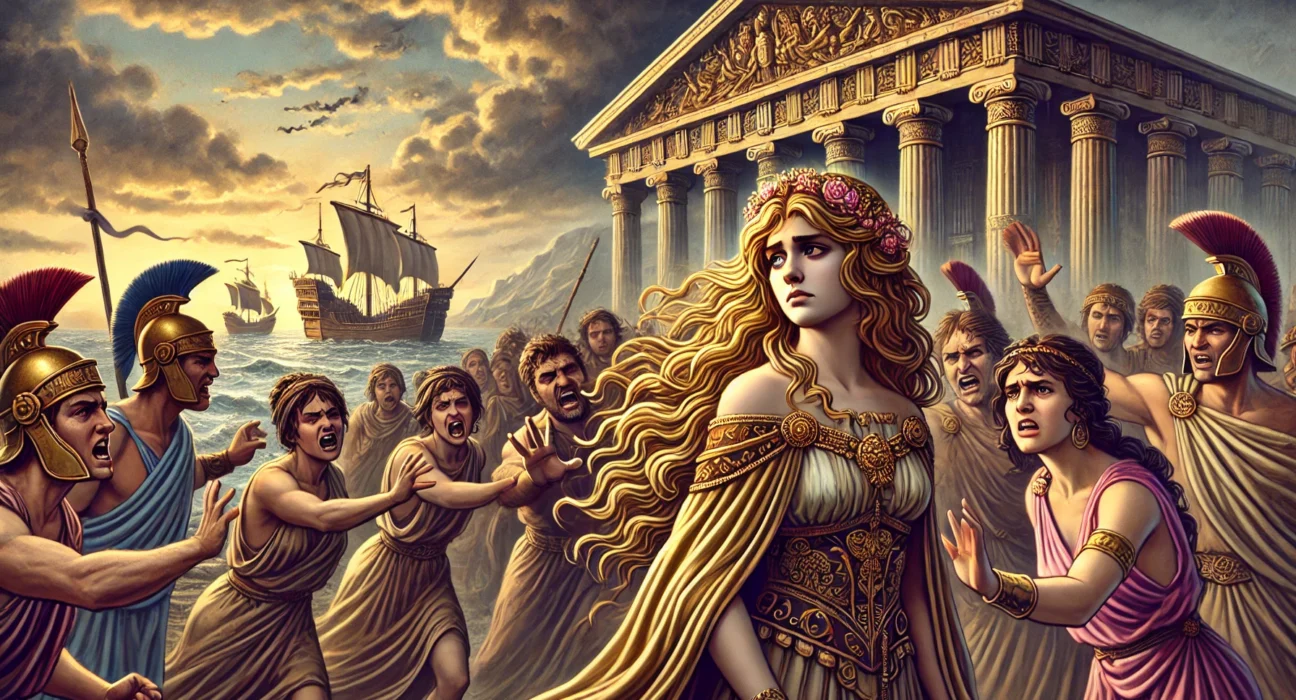Helen of Troy was written by Andrew Lang, a Scottish poet and folklorist, and published in 1882. This poem reimagines the ancient myth of Helen, the Queen of Sparta, whose abduction by Paris led to the infamous Trojan War. Lang’s narrative weaves classical Greek mythology with his poetic style, recounting the tragic events that follow Helen’s departure from her home, exploring themes of fate, love, and destruction. The tale draws from the Iliad and other ancient texts, though it is delivered through Lang’s distinctive Victorian lens.
Plot Summary
In the golden halls of Lacedaemon, King Menelaus rose early, filled with the joy of his kingdom’s prosperity. His servants bustled about, preparing a lavish feast, for a visitor had arrived—none other than Paris, the prince of Troy. Alongside his host, Paris basked in the warmth of the palace’s hospitality. The halls shimmered with gold and silver, reflecting the sunlight that poured through tall windows. Among the gathered was Helen, the queen whose beauty outshone all others. She descended from her chamber, her fair face a vision of dawn, and in her presence, time seemed to slow, even as a storm gathered over the horizon of fate.
Paris, enchanted from the moment his eyes fell upon Helen, revealed the purpose of his visit. He had not come to wage war but to claim the prize Aphrodite had promised him—Helen herself, the most beautiful woman in the world. For it was long ago on the slopes of Mount Ida, that Paris was tasked with judging a contest of beauty among the goddesses Hera, Athena, and Aphrodite. Tempted by Aphrodite’s promise of Helen’s love, Paris awarded her the golden apple. Now, with the goddess’s spell upon her, Helen was drawn to Paris, though her heart trembled between desire and fear.
Menelaus, unaware of the treachery brewing under his roof, set off for Crete on matters of state, leaving Helen and Paris alone. The goddess Aphrodite, relentless in her designs, visited Helen during the night, urging her to leave her husband and kingdom behind. She promised Helen that, upon waking, she would remember nothing of her shame. Helen, though torn, fell under the goddess’s spell, and when dawn broke, she fled with Paris, sailing away across the Aegean Sea towards Troy.
Their journey was filled with enchantment. The sea, usually cruel, turned gentle under the influence of the gods. Sea creatures danced in the ship’s wake, and the winds carried them swiftly to the Trojan shores. There, in the land of Priam, Helen was welcomed as a queen. The people of Troy, mesmerized by her beauty, forgot the shadow that now loomed over their city. Only Cassandra, the ill-fated prophetess of Troy, cried out in despair, her warnings of ruin lost in the joyous celebration.
As Helen settled into life in Troy, Menelaus returned to find his wife gone. His heart darkened with rage, and he called upon his brother, Agamemnon, king of Mycenae, to help reclaim his honor. Soon, the call to arms rang across Greece, summoning the mightiest of warriors to sail for Troy. Agamemnon, the formidable Achilles, cunning Odysseus, and countless others prepared for war, their ships darkening the seas as they converged on the shores of Ilium. A thousand ships set sail, carrying with them the fate of nations.
In Troy, life continued, though whispers of the impending war began to circulate. Paris, ever hopeful, believed that his city would withstand the storm. Hector, his elder brother, a noble warrior and protector of Troy, feared the consequences of Paris’s actions but stood resolute in defense of his homeland. King Priam, though wary, welcomed Helen as one of his own, showing her the kindness of a father. Yet beneath the surface, unease simmered, for the gods themselves had taken sides in the coming conflict.
Soon, the Greek fleet arrived at the Trojan shores, and the long siege began. For nine years, the Greeks and Trojans clashed, neither side gaining the upper hand. The plains of Troy were soaked with the blood of heroes. Achilles fought like a demigod, his rage unyielding, while Hector defended the gates of Troy with unmatched valor. Inside the city, Helen watched as the war, born of her beauty, ravaged both sides. She felt the weight of her choices, though the spell of Aphrodite dulled the sharpest edges of her guilt.
As the war dragged on, the gods themselves grew restless. Aphrodite continued to protect Helen and Paris, while Hera and Athena, scorned in the contest of the golden apple, favored the Greeks. Each battle was not only a struggle between men but also a contest of divine will. The walls of Troy, crafted by gods, held firm, but the city’s spirit began to wane as the losses mounted.
One fateful day, as the Greeks and Trojans prepared for yet another battle, a shadow of doom fell over the royal household. Paris, ever the source of the city’s turmoil, had long ago forsaken his first love, Oenone, a nymph of Mount Ida. Oenone had borne him a son, Corythus, whom she now sent to Troy, unaware of the danger that awaited him. Bearing a message for Paris, Corythus entered the city, but before he could deliver it, fate intervened. Paris, consumed by jealousy and mistrust, mistook Corythus for a rival and, in a moment of blind rage, killed his own son without knowing his true identity.
The horror of his act shattered whatever joy Paris had clung to. Grief and guilt overwhelmed him, but it was too late—Troy’s downfall was sealed. Helen, too, was struck with a renewed awareness of the devastation her love had wrought. Her beauty, once a blessing, had become a curse upon the world, bringing nothing but sorrow and death. As the Greek forces intensified their siege, Troy’s walls, which had once seemed impenetrable, began to crumble, not just from the relentless attacks, but from within.
The war raged on, leading to the infamous moment when the Greeks, through cunning and deceit, brought the city to its knees. Inside a wooden horse, the Greeks infiltrated Troy, opening its gates to their waiting army. The city, once vibrant with life, was consumed by fire and sword. Paris met his end, as did Hector, and with them fell the great city of Troy. Helen, now a queen without a kingdom, stood in the ruins, her fate intertwined with the ashes of the once-great city.
And so, with Troy’s fall, the world turned, the war’s dust settling into legend. Helen, the woman who had set it all in motion, remained a symbol of love’s destructive power, her name echoing through the ages, a reminder of the tragic beauty that could bring gods and men alike to their knees.
Main Characters
- Helen: Known for her unparalleled beauty, Helen is the queen of Sparta, and wife of Menelaus. Her elopement with Paris sets off the Trojan War. Helen is portrayed with a mix of innocence and regret as she becomes a pawn of divine forces.
- Paris: A prince of Troy, whose love for Helen leads him to abduct her from Sparta, igniting the ten-year conflict. Paris is impulsive, driven by passion, and swayed by Aphrodite, the goddess of love, who promises him Helen.
- Menelaus: King of Sparta, Helen’s husband, and the wronged party in her abduction. Menelaus’s rage over the loss of Helen prompts him to lead the Greeks in the war against Troy.
- Aphrodite: The goddess of love, who plays a crucial role in Paris and Helen’s affair. Her divine intervention ensures Helen’s love for Paris but also stirs the wrath of other gods and mortals.
- Priam: The aging king of Troy, father of Paris. He is torn between the desires of his son and the impending doom that Helen’s presence brings to Troy.
- Cassandra: A prophetess cursed never to be believed, Cassandra foresees the destruction of Troy but is ignored. She is one of the most tragic figures, embodying the ignored voice of fate.
- Hector: The noble Trojan prince and Paris’s brother, who foresees the war’s devastation but still fights valiantly to defend his city.
Theme
- Fate vs. Free Will: The poem grapples with the tension between destiny and individual choice. While Helen and Paris follow their desires, it becomes clear that larger, uncontrollable forces (the gods and fate) are driving them toward inevitable disaster.
- The Power of Beauty: Helen’s beauty is both a blessing and a curse. It makes her the object of desire for men and gods alike but also becomes the cause of ruin for both Sparta and Troy. Lang uses Helen as a symbol of beauty’s dangerous power.
- Divine Intervention: The gods in Helen of Troy are heavily involved in human affairs, particularly Aphrodite. Their manipulation underscores the helplessness of mortals who become mere pawns in the gods’ games.
- War and Honor: As the Trojan War erupts, the poem explores themes of honor, duty, and the devastation of war. The conflict brings out both the nobility and the destructiveness in characters like Hector and Menelaus.
- Love and Betrayal: The love between Paris and Helen is portrayed as both romantic and doomed. Their relationship, influenced by divine forces, leads to betrayal, destruction, and death, making love a double-edged sword in the narrative.
Writing Style and Tone
Andrew Lang’s writing in Helen of Troy blends classical themes with his rich, lyrical Victorian style. His language is highly poetic, full of vivid imagery, mythological allusions, and dramatic descriptions. Lang uses detailed and elevated prose to bring the ancient world to life, invoking the grandeur and tragedy of myth. His command of language allows readers to feel both the beauty and sorrow of Helen’s story.
The tone is a mixture of romanticism and melancholy. Lang romanticizes the ideals of beauty, love, and heroism, but tempers them with an underlying sense of inevitable doom. Even in moments of joy, there is a tragic undertone, as the reader is aware of the impending fall of Troy. This tension creates a tone that is both nostalgic for lost ideals and reflective of the harsh consequences of passion and war.
We hope this summary has sparked your interest and would appreciate you following Celsius 233 on social media:
There’s a treasure trove of other fascinating book summaries waiting for you. Check out our collection of stories that inspire, thrill, and provoke thought, just like this one by checking out the Book Shelf or the Library
Remember, while our summaries capture the essence, they can never replace the full experience of reading the book. If this summary intrigued you, consider diving into the complete story – buy the book and immerse yourself in the author’s original work.
If you want to request a book summary, click here.
When Saurabh is not working/watching football/reading books/traveling, you can reach him via Twitter/X, LinkedIn, or Threads
Restart reading!








